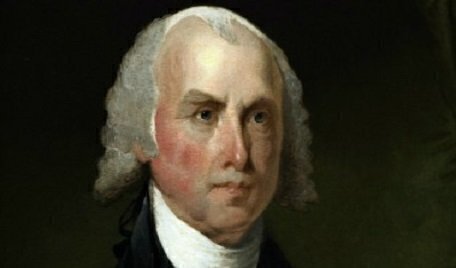In this excerpt from The Atlantic’s October 2018 print edition, National Constitution Center president and CEO Jeffrey Rosen looks at James Madison’s fear of mob rule and what Madison would think of democracy today.
 James Madison traveled to Philadelphia in 1787 with Athens on his mind. He had spent the year before the Constitutional Convention reading two trunkfuls of books on the history of failed democracies, sent to him from Paris by Thomas Jefferson. Madison was determined, in drafting the Constitution, to avoid the fate of those “ancient and modern confederacies,” which he believed had succumbed to rule by demagogues and mobs.
James Madison traveled to Philadelphia in 1787 with Athens on his mind. He had spent the year before the Constitutional Convention reading two trunkfuls of books on the history of failed democracies, sent to him from Paris by Thomas Jefferson. Madison was determined, in drafting the Constitution, to avoid the fate of those “ancient and modern confederacies,” which he believed had succumbed to rule by demagogues and mobs.
Madison’s reading convinced him that direct democracies—such as the assembly in Athens, where 6,000 citizens were required for a quorum—unleashed populist passions that overcame the cool, deliberative reason prized above all by Enlightenment thinkers. “In all very numerous assemblies, of whatever characters composed, passion never fails to wrest the sceptre from reason,” he argued in The Federalist Papers, the essays he wrote (along with Alexander Hamilton and John Jay) to build support for the ratification of the Constitution. “Had every Athenian citizen been a Socrates, every Athenian assembly would still have been a mob.”
Madison and Hamilton believed that Athenian citizens had been swayed by crude and ambitious politicians who had played on their emotions. The demagogue Cleon was said to have seduced the assembly into being more hawkish toward Athens’s opponents in the Peloponnesian War, and even the reformer Solon canceled debts and debased the currency. In Madison’s view, history seemed to be repeating itself in America. After the Revolutionary War, he had observed in Massachusetts “a rage for paper money, for abolition of debts, for an equal division of property.” That populist rage had led to Shays’s Rebellion, which pitted a band of debtors against their creditors.
Madison referred to impetuous mobs as factions, which he defined in “Federalist No. 10” as a group “united and actuated by some common impulse of passion, or of interest, adversed to the rights of other citizens, or to the permanent and aggregate interests of the community.” Factions arise, he believed, when public opinion forms and spreads quickly. But they can dissolve if the public is given time and space to consider long-term interests rather than short-term gratification.
To prevent factions from distorting public policy and threatening liberty, Madison resolved to exclude the people from a direct role in government. “A pure democracy, by which I mean a society consisting of a small number of citizens, who assemble and administer the government in person, can admit of no cure for the mischiefs of faction,” Madison wrote in “Federalist No. 10.” The Framers designed the American constitutional system not as a direct democracy but as a representative republic, where enlightened delegates of the people would serve the public good. They also built into the Constitution a series of cooling mechanisms intended to inhibit the formulation of passionate factions, to ensure that reasonable majorities would prevail.
To read the full article on The Atlantic's website, go to: https://www.theatlantic.com/magazine/archive/2018/10/james-madison-mob-rule/568351







